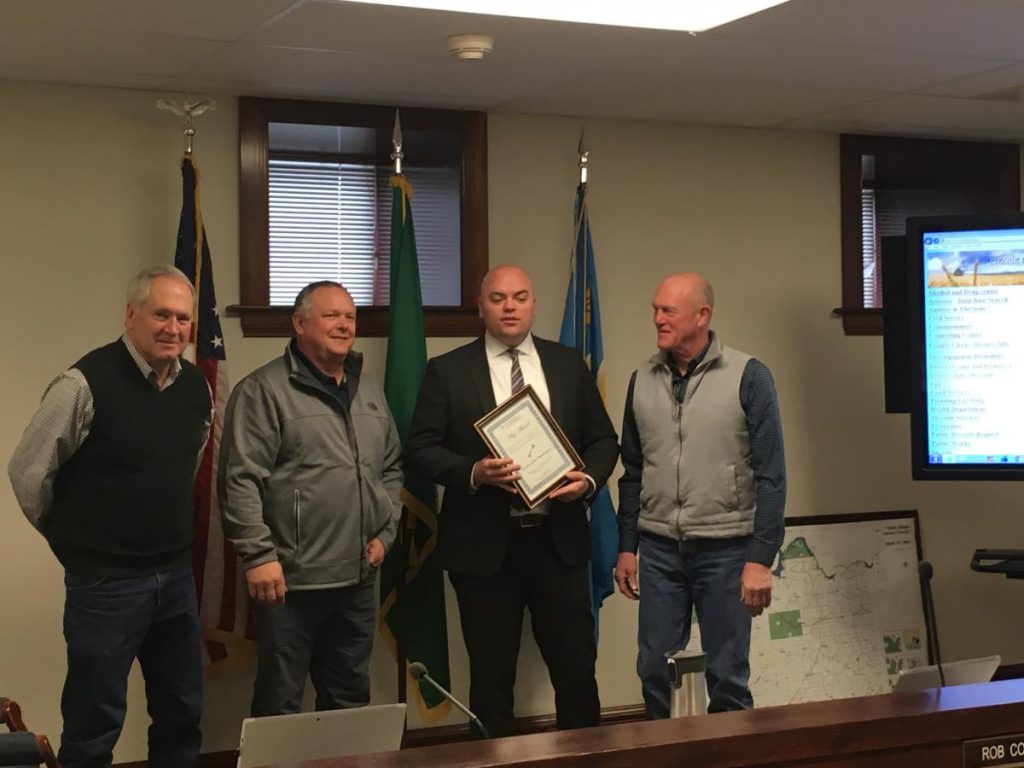“There is a common denominator. Since 2014, the genesis of (collective bargaining transparency policies) in every single council and board… you can’t deny that this has had its genesis from two of the folks in this room from the Freedom Foundation. That’s undeniable. Every single place it has been at, the Freedom Foundation has been there.”
— Paul Parmley, president
AFL-CIO North Central Washington Central Labor Council,
during public comments at a Douglas County commissioners meeting.
Steve Bruchman, Teamsters 760 business agent, may have said it best when he described the Freedom Foundation’s relentless push for government labor reform. “This is a form of guerrilla warfare,” he said. “They go out and they snipe here and there. You never know where they are going to pop up and where they are going to take their shots.”
It is nice to receive recognition for all the years of hard work.
The Freedom Foundation has been taking the lead on collective bargaining transparency in Washington for years. From writing resolutions and ordinances to legal analysis, public testimony, emails, mailers and meetings with elected officials, no one has done more to advance collective bargaining transparency than the Freedom Foundation.

At this point the only thing that remains unclear is how anyone can claim local governments being more transparent is a bad thing. And yet that’s precisely the argument public-sector union leaders offer up in response whenever a Washington jurisdiction — no matter how small — announces its intention to open its collective bargaining negotiations to public scrutiny.
Aside from opposing transparency simply because the Freedom Foundation supports it, one would think the unions must have some cogent arguments to oppose it.
But they don’t.
Union leaders warn there will be unspecified “disturbances” if the meetings are open, or that it’s not in the public interest or that it will cost taxpayers money.
What union leaders don’t say while they outline their flawed arguments against transparency is that it’s their members they most want kept in the dark about the extent to which the union is playing politics with their dues money.
Lincoln County passed its resolution to encourage taxpayers to vote on a tax increase that would allow the county to increase salaries for public employees several years ago. But the Teamsters representing those same employees sued to prevent the county from following through with its promise to the taxpayers.
Lincoln County wants to pay its employees more and literally used the resolution as a means to give a raise to public employees.
Whose interest do the Teamsters really have in mind?
Outside agitators like the Teamsters are trying to intimidate local government with threats of litigation costs, outrageous public displays and a slowed process. But once the meetings are open, everyone will be able to see who the bad actors are.
The cause of problems in the bargaining will be exposed for all to see. Transparency will be the solution to whatever problems arise from it.
Union leaders say they’re concerned their actions during bargaining will be mischaracterized and taken out of context. But this is already happening to management as unions go back to their members and feed them biased, secondhand information that benefits leadership.
Opening meetings to public observation and recording them for posterity creates an ability to set the record straight and helps to prevent either side from mischaracterizing the actions of the other.
Union leaders suggest a policy of transparency is intended to put “sand in the gears of the process,” but we strongly believe making the process public increases the likelihood of expedited negotiations. The goal is not to slow things down; it is to make them efficient, speedy and accountable – an important benefit to local governments, public employees and taxpayers.
“Opening our meetings to the public allowed us all to stay focused on the topics,” said Soap Lake School Superintendent Sunshine Pray of her community’s experience with transparency, “and I believe it contributed to a quicker and more civil conclusion.”
“Opening collective bargaining to the public brings accountability to everyone,” added Soap Lake’s School Board member Curt Dotson. “No more ‘lost in translation.’
“Taxpayers have a right to know what’s happening with their money in public education,” he said, “and the public employees, i.e., teaching staff, deserve to know how they’re being represented.”
What they deserve is a union that cares what’s best for its members more than it does what’s best for its leaders and the leftist agenda they support. And the Freedom Foundation is working to see to it they get it.











